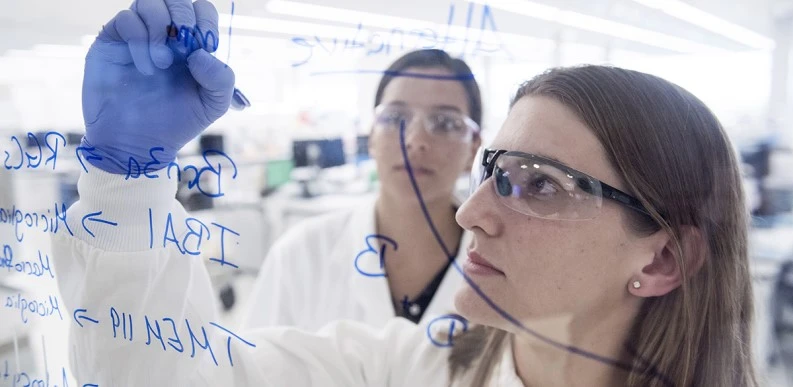In the 21 years since our first trial with a targeted agent that transformed patient outcomes for chronic myeloid leukemia (CML), we’ve continued to work with the vision that anyone living with these conditions has the right to a life free from pain, free from symptoms and free from disease. This September, for Blood Cancer Awareness Month, learn how we’re aiming to make our vision a reality.
Reaching to the Future
There is no single way to treat cancer. That’s why we are focused on reimagining cancer care through four distinct therapeutic platforms – targeted therapies, cell and gene therapy, immunotherapy and radioligand therapy. These platforms place us at the cutting edge of blood cancer treatment.
We’re proud to have revolutionized oncology research, particularly within CML. Our targeted therapies have helped transform CML from a life-limiting disease to a chronic one for many patients – with the opportunity to attempt treatment-free remission. Looking ahead, early studies combining an investigational treatment with current standards of care have shown the potential to advance CML patient care further. We are encouraged by these results and are continuing our research.
Similarly, with CAR-T cell therapy , we have introduced a groundbreaking treatment to patients with advanced blood cancers. With the vision to cure B-cell malignancies with this personalized, one-time treatment, we have a deep cell and gene pipeline that focuses on broadening the impact of CAR-T cell therapy in multiple blood cancers. During 2019, we are opening several new clinical trials evaluating CAR-T cell therapy in various settings of diffuse large B-cell lymphoma and acute lymphoblastic leukemia, and in follicular lymphoma; and we are exploring new technologies and combinations of CAR-Ts with the goal to further optimize outcomes of cell and gene therapies in patients with B-cell malignancies. We are also researching next-generation CAR-Ts that focus on new targets.

Going Big on Data for Blood Cancers
With many blood cancers, patient populations can be small and there is a lack of data to help inform advances in treatment and care. Therefore, gathering data at scale is critically important and can better help define clinical endpoints and outcomes. This was the idea by which the HARMONY Alliance was formed to develop an outcomes-based platform for six specific blood cancers.
HARMONY, a European Big Data initiative, brings together more than 50 partners in both the public and private sectors to make the sharing of such data possible, encouraging open collaboration in hematology research and empowering policymakers and payers to improve decision-making when it comes to blood cancers. HARMONY partners work together to collect data from all over Europe on as many patients with blood cancers as possible.
Novartis is proud to be the industry lead for HARMONY, and to work with our partners to change the way we collect and use big data for the benefit of patients. In March 2019, Novartis became the first industry partner to transfer data to the HARMONY Alliance – data from the RATIFY trial, which was the largest clinical trial in FLT3-mutated acute myeloid leukemia (AML) to date. Through our ongoing involvement in and commitment to projects like HARMONY, Novartis looks toward elevating the role of real-world evidence to help provide real-time oncology solutions.
We hope the shared vision of HARMONY can also act as a blueprint for other disease areas around the world.
We ultimately hope that people will look back on HARMONY and say, "That’s when everything changed."
Fionnuala Doyle, Head of Global Policy and Health Care Systems for Novartis Oncology

Innovation Beyond Our Products: Sustainable Access
We know it’s not enough to only focus on the development of innovative treatments if these can’t be accessed by those who need them most. That is why we explore innovative access programs and collaborative initiatives for patients in a variety of disease areas.
Our most recent partnership looks at sickle cell disease – a lifelong genetic blood disorder. While sickle cell is a global disease, it is most widespread in sub-Saharan Africa. Unfortunately, we can see a clear disparity when comparing Africa with other parts of the world where sickle cell is often managed as a chronic disease. Building on years of engagement in Africa working to reduce the impact of malaria and other conditions, Novartis is taking steps to help address the needs of sickle cell patients as well, beginning in Ghana.
In January 2019, we announced a partnership with the Ghanaian Ministry of Health, the Ghana Health Service and Sickle Cell Foundation of Ghana, which includes the establishment of treatment guidelines, newborn screening and centers of excellence, and making accessible treatment options available, continuing our work to help ensure sustainable access to our products for hematology patients. Novartis also initiated a collaboration with Zipline, the world’s largest medical drone delivery service, to further facilitate access to medicines.
It is estimated that every year 15,000 children born in Ghana are affected by sickle cell disease. To compound this issue, patients may struggle to access medication and healthcare, and often have to travel long distances just to reach a hospital.
The first pilot use of Zipline took place in June 2019 and delivered treatment straight to the doorstep of 11-year-old sickle cell patient Ohene Kwaku. The impact of innovative technology such as this on patients, who often travel for hours just to access treatment, is immeasurable, and we look forward to rolling the service out further this year.
We want Ghana to be a champion for the rest of the African countries and show that this can be done. Having sickle cell disease is not a death sentence to children and families in Africa or elsewhere.
Dr. Patrice Matchaba, Group Head of Global Health and Corporate Responsibility at Novartis
